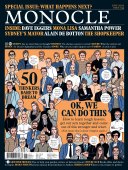
Issue 134
Monocle’s worldly-wise June issue is a special issue for special times. We hand over our pages to 50 leading voices and ask what’s next for our cities, our homes, our businesses and much more. We have contributions from leading figures across the board; you’ll want to know what they say. Elsewhere, we’ve amassed the ultimate cultural to-do list, including films, design finds, books and recipes. Plus: five talented photographers capture the essence of their cities in a state of flux. Curious? Then dive right in.
In This Issue
Oops! No content was found.
Looks like we no longer have content for the page you're on. Perhaps try a search?
Return Home

